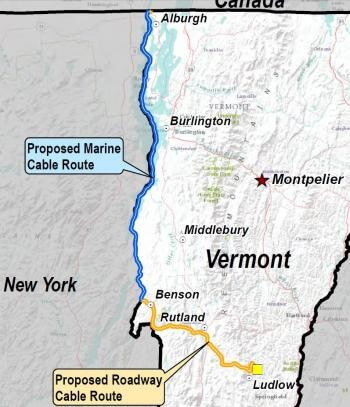New England Clean Power Link to begin construction next year

Lake health and property tax concerns arise with proposed project
The New England Clean Power Link is a 1,000-megawatt electric transmission line slated to carry electricity produced from hydroelectric dams in Canada and wind turbines in New York to southern New England utilities via Lake Champlain, passing by Charlotte’s shores on the way.
This project is backed by Gov. Phil Scott. It’s been reported that it could bring the state about $7.5 million annually for the next 40 years, partly through new jobs and tax revenue. The 154-mile underwater and underground transmission line is a $1.2 billion project.
 Since Vermonters will be getting little to no power from the project itself, state officials have asked for and received the promise of a significant benefit. Right now, part of the deal is that about $300 million over the next 40 years will be given to Vermont for Lake Champlain cleanup efforts.
Since Vermonters will be getting little to no power from the project itself, state officials have asked for and received the promise of a significant benefit. Right now, part of the deal is that about $300 million over the next 40 years will be given to Vermont for Lake Champlain cleanup efforts.
Lake Champlain suffers from phosphorous buildup from farms and roads that have caused algae blooms in waters across Vermont for decades. Some see these funds as a possible solution to an ongoing and seemingly insurmountable problem for the state.
This power line is to be built by Transmission Developers Inc. New England (TDI NE). While obtaining the proper state permits to move forward with the project, its offer to provide funding for Lake Champlain cleanup and other incentives is not the direct return some town officials are seeking.
The Town of Charlotte is not new to this cable-burying trend in the lake for power. VELCO has a transmission line buried off our shores. Selectboard Chair Lane Morrison said, “For Charlotte and other lakefront communities, there is a desire to collect property tax for the right to bury an electrical power line off the shore of our towns in the deep water of Lake Champlain.”
Morrison said the case is being made legally to secure the right to collect an annual property tax on a town-by-town basis. “The power line is passing through Vermont on land, and in the water, for the sole purpose of providing electricity to the State of Massachusetts,” Morrison said. “When VELCO, years ago, buried a transmission line through the town, there was a major effort to collect property taxes and ultimately it was successful. The TDI issue is somewhat similar.”
Charlotte and other lakeshore towns are considering a lawsuit to require TDI to pay property/equipment taxes on the lines installed within the lake. “The legal issues are ongoing and are of a confidential nature, so there is not a lot more the town is prepared, at this time, to discuss,” Morrison said.
James Ehlers, the executive director of Lake Champlain International and an announced Democratic candidate for governor in 2018, supports the Town of Charlotte in its effort. “These entities should be paying property taxes,” he said. “All power comes at a cost. These communities and this state should not be exploited to offer neighboring states cheap power. We need to ensure we are being adequately compensated before we commit to serving as this conduit to satiate the needs of Boston and New York.”
Charlotte-Hinesburg Rep. Mike Yantachka said the TDI project will be a significant source of clean hydro power on the New England electric grid. “Vermont’s in-state electric generation is highly renewable, but we still import some power from other states in the New England power grid, some of which is generated by coal, fuel oil and natural gas,” he said. “Any clean energy that offsets fossil-fuel-based generation will be good for the entire region, including Vermont, in our efforts to address climate change.”
The proposed cable is projected to start at the U.S.-Canadian border and travel about 97 miles underwater down Lake Champlain to Benson, Vermont. Then it will be buried along town and state road and railroad rights-of-way or on land owned by TDI NE for approximately 57 miles to a new converter station to be built in Ludlow, Vermont. Project construction is expected to begin in 2018 and continue through 2021. The line will not use any railroad right-of-way or land component in Charlotte. Town officials said it will be entirely under the lake until it reaches Benson.
The United States Department of Energy (DOE) issued the Presidential Permit for the project after receiving approval from the U.S. Departments of State and Defense and after consulting with the U.S. Army Corps of Engineers, Fish and Wildlife Service, Coast Guard and Environmental Protection Agency. The Vermont Agency of Natural Resources and Army Corps of Engineers issued nine other permits confirming that the construction and operation of the Clean Power Link will be in compliance with Water Quality Standards and the federal Clean Water Act.
